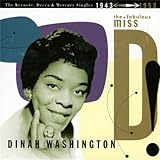Many people are familiar with the great Black women singers of the 1930s through the 1960s. Women such as Billie Holliday, Ella Fitzgerald, and Lena Horne.
But, sadly, so many people are not acquainted with the great Dinah Washington.
Born Ruth Lee Jones (August 29, 1924 – December 14, 1963) in Tuscaloosa, Alabama, she was an American blues, R&B and jazz singer. She has been called “the most popular black female recording artist of the ’50s”, and she is called “The Queen of the Blues”. She is a 1986 inductee of the Alabama Jazz Hall of Fame, and she was inducted into the Rock and Roll Hall of Fame in 1993.
Ms. Washington recorded with the likes of Lionel Hampton, Clifford Brown, Quincy Jones, and Brook Benton.
She changed her name from Ruth Jones upon joining jazz vibraphonist Lionel Hampton’s band in 1943. After leaving Hampton in 1946, she began her own recording career, leading to Top 10 R&B hits in “Baby Get Lost” (No. 1, 1949), “Trouble in Mind” (No. 4, 1952), “What a Diff’rence a Day Makes” (No. 4 R&B, No. 8 pop, 1959), and “This Bitter Earth” (No. 1 R&B, No. 24 pop, 1960).
In 1960, Washington also sang two No. 1 R&B duets with Brook Benton, “Baby (You’ve Got What It Takes)” (No. 5 pop) and “A Rockin’ Good Way” (No. 7 pop).
She recorded under various record labels such as Keynote, Mercury, EmArcy, and Roulette from 1942 through 1963. She left behind a memorable body of discography. Her voice—so soft, so strong, so melodious, so vibrant.
The Fabulous Miss D: The Keynote, Decca, & Mercury Singles 1943-1953 by Dinah Washington (2010) – Box set (3)
Essential – Great Songs by Dinah Washington (Audio CD – Nov 3, 1992) (12)
Ms. Washington married eight times and divorced seven times. She had two children.
In the early morning hours of December 14, 1963, Ms. Washington’s eighth husband, Dick “Night Train” Lane went to sleep with his wife. He awoke later to find she had slumped over and was not responsive. A doctor was called to the house and he came to the scene. After examining her, he pronounce her dead. An autopsy later showed a lethal combination of secobarbital and amobarbital which contributed to her death at the age of 39, which was ruled an accident. She is buried in the Burr Oak Cemetery in Alsip, Illinois.

Here she sings “This Bitter Earth”, a 1960 song written by Clyde Otis. The song topped the U.S. R&B charts for the week of July 25, 1960 reaching #24 on the U.S. pop charts. The song figures prominently in the 1977 film Killer of Sheep by director Charles Burnett. It is also featured in the end credits of the 2010 Leonardo di Caprio film Shutter Island which was directed by Martin Scorsese.
The haunting and mournful lyrics evoke sadness, sorrow, resignation towards a world which can at times be extremely hard on all of us who pass through it, though in the end, with the love of someone who cares about us, this bitter earth may not be so bitter after all.
This Bitter Earth
(Dinah Washington / Max Richter – This Bitter Earth / On The Nature Of Daylight)
This bitter, bitter earth
What fruit it bears
What good is love
That no one wants to share
And if my life, my life is like the dust
That hides the glow of a rose
Tell me what good am I
Heaven, heaven, heaven, heaven only knows
Ooooooooooh, this.. this bitter earth
Well I found it can be, be so, be so cold
Today you’re young
And before you know it
Too soon, you’ve grown old
But while the voice within me cries
Someone, someone may answer my call
And this bitter earth, this bitter, bitter earth
May not be so bitter after all
While the voice, while this voice within me cries
Someone, someone may answer my call
And this, this bitter earth.. this real cold earth
Mmmmhhmmmm… May not be so bitter after all.






“Without education, you’re not going anywhere in this world.” I pour libations for my ancestor Dinah Washington, Ase!
I love this song ever since I first heard it on the movie “shutter Island”. I have deep sadness from losing a son to suicide at age 23, I find meaning in the words of this song. Specifically, the part:”if my life is like the dust that hides the glow of a rose, what good am I?” To me, it helps me to see that I don’t want my sadness to cloud the beauty that is still in this life…thank you for your beautiful voice Dinah!
Pingback: . . . .AND NOW FOR SOMETHING COMPLETELY DIFFERENT: “KILLER OF SHEEP” (1979) | BEAUTIFUL, ALSO, ARE THE SOULS OF MY BLACK SISTERS